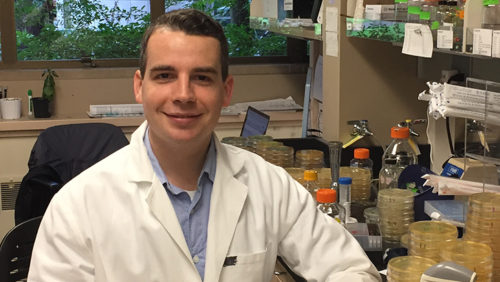Member Spotlight: We Welcome Dr. John Whitney

The New Year brought a new addition to the IIDR team. At the beginning of January, we welcomed Dr. John Whitney, Assistant Professor, Department of Biochemistry and Biomedical Sciences. John and his team in The Whitney Lab are focused on bacterial pathways that influence the composition of microbial communities relevant to human health and the environment.
In his spotlight interview, John takes us on his journey from undergrad to his current role at IIDR; gives a thoughtful summary of his research; and explains why he is excited to be part of the IIDR team.
Q: What is your research background?
Growing up I always had a strong interest in the structure of biological molecules and this led me to pursue a degree in Biological Chemistry at the University of Guelph in the Department of Chemistry. I applied my interest in chemical sciences to biological problems and that led me to completing my PhD at the Hospital for Sick Children in Toronto. There, I learned about structural biology and studied proteins involved in biofilm formation. Biofilms are populations of bacteria encased in a slime-like substance, which protects them from environmental insults including antibiotic treatment.
During my postdoctoral studies at the University of Washington, I started developing an interest in the interactions between microbes within bacterial communities and more specifically, a pathway involved in interbacterial warfare. The lab I worked in at the University of Washington had recently started to characterize a pathway that was involved in the injection of antibacterial toxins from one bacteria into another. One of the really cool findings was that some bacteria produce immunity factors that resist the activity of toxins. They could survive these interbacterial conflicts. Therefore, these immunity factors can be thought of as a ‘compatibility code’ to determine whether a specific species of bacteria can co-exist with other species of bacteria in a complex community.
Q: Can you tell us more about the research you’re working on in The Whitney Lab and why it’s important?
The research I did at the University of Washington opened up many lines of investigation that I will pursue here at McMaster. In addition to characterizing the molecular details underlying toxin delivery between bacteria, we’re also uncovering new pathways involved in interbacterial competition.
If we can understand what allows bacteria to exist or be excluded from a given population we might one day begin to rationally manipulate these populations.
There are bacterial communities all over the planet in all kinds of different environments. Understanding the interactions between microbes at a mechanistic level is relatively new and is emerging as an important topic as we try to understand the forces that shape complex bacterial populations.
For example, a popular topic right now is the human gut microbiome. Among the factors that shape its composition, interbacterial competition has now been demonstrated to play a role in permitting or excluding certain bacterial species.
Q: What is a real world application of your research?
So I touched on the idea of being able to rationally manipulate bacterial communities. One possibility could be engineering strains of bacteria that can ward off pathogens. This could be potentially useful to humans in the form of a probiotic.
Q: What are some accomplishments that you’re proud of in your career thus far?
I’ve been fortunate to receive many funding and scientific recognition awards throughout my training but at this point in my career I find it much more satisfying when the people I mentor receive awards. I trained a number of students at the University of Washington where there were a lot of opportunities for students to be funded through the Gates family. Based on a proposal a student and I put together, she was funded by the Mary Gates Foundation and this was something her and I put a lot of time and effort into. I was very happy when she received that award.
Q: Why did you want to join the IIDR team and what does this new role mean to you?
Being born and raised in Ontario, I always wanted to establish a career back in Canada. However, I always felt it was important that I receive training abroad and bring these skills back to Canada. When I talked to faculty from institutions around the world, McMaster always came up as one of the top institutions for microbiology research in Canada.
What gets me excited about being here is we’ve got a great team of people who are interested in problems that relate to bacteria in many different ways. There’s a lot of research being done in important fields like antibiotic resistance, but there’s also a lot of interest in basic prokaryotic biology. Having strengths in both of these areas makes the IIDR a great place to do research in microbiology.
Q: Do you have any New Year’s resolutions?
Adjusting back to Canadian winters.
Q: What are some of your hobbies outside of the lab?
Having lived in the Pacific Northwest for four years, I very much enjoyed hiking in the mountains. The Cascade mountains are just 45 minutes outside of Seattle. I’ve heard Hamilton has a mountain too, so I’ll have to go check it out sometime.
Related News
News Listing

McMaster Health Sciences ➚
Overcoming resistance: McMaster researchers find new utility for old antibiotics
News
January 6, 2025

December 19, 2024


